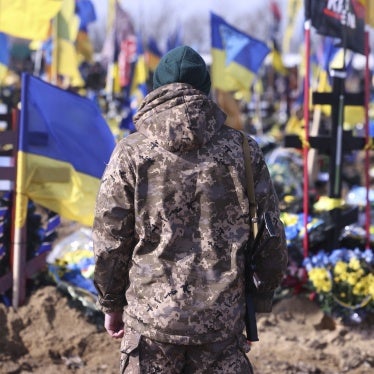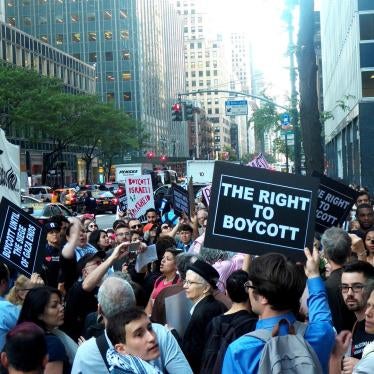We welcome Secretary-General Kofi Annan’s recent report on Sudan to the Security Council (S/2005/57) and its proposal for the establishment of a multidimensional U.N. peace support mission in Sudan. We applaud the Secretary-General’s proposals on protection, the integration into the U.N. operation of human rights monitoring throughout Sudan to include a significant presence in Darfur, and the emphasis on the need to develop a transitional justice strategy in accordance with the Secretary-General’s report “The Rule of Law and Transitional Justice in Conflict and Post-conflict Societies” (S/2004/616). Human Rights Watch urges the Security Council to explicitly include these elements in the resolution that you will soon be adopting. We also take this opportunity to suggest ways to strengthen the current proposals to improve human rights and civilian protection in Sudan as a whole and Darfur in particular.
Mandate: The Secretary-General’s report recommends that one of the mission’s main tasks should be “to take action necessary to protect civilians under imminent threat of physical violence within the capability of the U.N. formed military units.”
We believe it essential to provide sufficient military capability to ensure that civilians get the level of protection they need and deserve. The mandate should explicitly include “using any means necessary” to alert would-be abusers that the United Nations presence cannot be defied without immediate military consequences. This provision in the mandate will serve as a deterrent together with proactive patrolling by small but robust units, as was done in Sierra Leone.
Cooperate and support efforts of the African Union in Darfur: We are pleased that the report states that the work of the United Nations and the African Union should be complementary and provides a degree of detail on how the two missions will coordinate and liaise in Sudan and Darfur. We strongly support the concept of close coordination between the United Nations and the African Union as it can provide enhanced protection for civilians in Darfur.
Protection: We also support the development of a Sudan-wide protection strategy and work plan, as stated in the Secretary-General’s report, focusing on return populations, host communities, displaced persons wishing to remain in situations of displacement until a durable solution can be found, and civilians in armed conflict, including in Darfur, in accordance with Resolutions 1265 (1999) and 1296 (2000). We suggest that these measures be specifically referred to in the resolution, as emphasized in the Secretary-General’s report.
Human Rights Monitoring: The Secretary-General’s report notes that impartial observation by human rights monitors throughout the country is needed, as allegations of human rights violations can jeopardize the peace process. The mandate of the human rights monitoring mission in Sudan should clearly include monitoring, documentation, and regular public reporting. Timely public reporting is also important as a deterrent and a preventive mechanism.
More than in any other location, a significant human rights presence in Darfur – including international monitoring, investigation, and public reporting of human rights violations – is critical. We urge the Security Council to support and facilitate the intended expansion of the United Nations Office of the High Commissioner for Human Rights’ (OHCHR) monitoring presence in Darfur, and assure that they report, periodically and publicly, on abuses in Darfur. We note here the recommendation by the International Commission of Inquiry on Darfur that the High Commissioner for Human Rights should issue public and periodic reports on the situation in Darfur. We urge the Council to specifically include periodic and public human rights reporting in the resolution. It is lamentable that the many victims and witnesses interviewed by the OHCHR monitors have no knowledge of the OHCHR’s conclusions and the follow-up to their complaints. Rumor continues to poison the environment in Darfur and exacerbate ethnic tensions. Publishing authoritative reports by this U.N. office will significantly help to clarify the situation and establish responsibility.
It is vital that the OHCHR monitors are deployed not only in the state capitals, but in Darfur’s cities, smaller towns, troubled rural areas where internally displaced persons are attempting to return, and near camps and concentrations of displaced persons. Finally, the mandate of the OHCHR in Darfur should be extended to include the monitoring, investigation, and public reporting on human rights violations committed by the three rebel groups in addition to abuses committed by other parties to the conflict.
It is also vital that the OHCHR monitors and the International Committee of the Red Cross be given full and unimpeded access to all those individuals in detention in relation to the situation in Darfur, as recommended by the International Commission of Inquiry on Darfur. The Council should demand that the government of Sudan provide such access as a matter of course.
Transitional Justice: We commend the report’s proposal that the U.N. mission develop with international and national stakeholders a transitional justice strategy in accordance with the Secretary-General’s report “The Rule of Law and Transitional Justice in Conflict and Post-conflict Societies” (S/2004/616).
The failure to include a comprehensive mechanism to address justice, reparations, and truth and reconciliation in the final Peace Agreement – as envisioned in Article 8.0 of the Nakuru Draft Framework for Resolution of Outstanding Issues Arising out of the Elaborations of the Machakos Protocol – is a major shortcoming of the Naivasha peace process. We urge the Security Council to emphasize in a resolution how important it is to address past abuses and impunity as a means to achieving lasting peace with justice and promoting national reconciliation.
The resolution should call on all parties to respect the human rights and fundamental freedoms outlined in article 1.6 of the Protocol on Power Sharing and other international human rights conventions. It should urge the parties to include accountability for past abuses and truth-telling as part of the comprehensive process of national reconciliation and healing mandated by article 1.7. We highlight the recommendation of the International Commission of Inquiry on Darfur that the government of Sudan create, through a broad consultative process including civil society and victims groups, a truth and reconciliation commission in Darfur once peace is established.
Reform of the police service in Sudan: We welcome the deployment of an international civilian police component to assist in developing a transparent police service in Sudan that is accountable to the community and has civilian oversight. We are concerned, however, that the deployment proposal does not include mandatory human rights screening for all individuals recruited into a new Sudan police force, in particular those in positions of command responsibility. The Security Council should firmly state the need for a comprehensive vetting process for police personnel.
Recovery, return and reintegration:
Southern Sudan - This component of the peace support mission would be strengthened by specific mention of provisions in the Peace Agreement that address land and property issues and compensation or reparations. Article 2.6 of the Agreement on Wealth Sharing during the pre-interim and interim periods calls for the establishment of a National Land Commission to, among other things, arbitrate and decide on land disputes. The United Nations’ assistance in performing this critical task will be essential to ensure its successful implementation and to contribute to post-conflict stability.
Darfur - The recovery, return, and reintegration measures outlined in the Secretary-General’s report appear to apply only to return of refugees and internally displaced persons to southern Sudan. Such measures should be extended to Darfur where a plan to reverse the ethnic cleansing and ensure the right to return for displaced communities is urgently needed. We suggest that such a plan include the following elements:
1. Improving security and freedom of movement in rural areas and villages so that displaced communities feel secure to return to their homes and lands. In practical terms, this means real disarmament and/or regulation of armed militia forces and an end to impunity and continuing attacks on civilians by any force.
2. Ensuring that no permanent land transfers are made as a result of ethnic cleansing in Darfur, i.e., preventing Janjaweed militias and others from profiting from the violent and forcible eviction of the Fur, Masalit, Zaghawa, and other targeted communities. A temporary ban on land transfers should be put in place and the Security Council should ensure U.N. involvement in the creation of the National Land Commission with a subsection specifically for Darfur (referred to above). This Darfur section of the Commission should employ respected historians, land use specialists, anthropologists, linguists, and others, both Sudanese and foreign, giving priority to those who have worked in Darfur. It should also employ representatives of each of the affected ethnic groups, as chosen by each group. The Darfur section of the Commission should be charged with mapping land use, ownership and customary land rights prior to the conflict and arbitrating disputes, devising mechanisms for regulating land use, and ensuring reparations. This Commission should also be tasked with making efforts to accommodate landless nomads and ensure that migration routes are respected.
3. Assisting returning displaced people and refugees with humanitarian relief and resources to rebuild their communities and livelihoods. Assistance with shelter, water resources, seeds and tools, health care, and food will need to be provided in places of return.
4. Compensation to victims should also be made in cash or in kind (livestock, seeds and tools) through a compensation mechanism. We also note the recommendation of the International Commission of Inquiry on Darfur that the United Nations establish an international compensation commission for payment of compensation to victims of crimes committed by government forces, de facto agents of the government, and rebel groups.
We have received reports that, rather than redressing or reversing the ethnic cleansing in Darfur, the Sudanese government may be moving to consolidate the illegal transfer of land and resources. We are concerned that while a political solution is being negotiated, land grabs may occur (informally and formally, through new decrees and legislation, forced relocation, resettlement and allocations to powerful persons) that could make ethnic cleansing very difficult to reverse.
The United Nations must take immediate steps to prevent such consolidation as it would guarantee continued instability and retribution in Darfur, reward the perpetrators of ethnic cleansing and leave almost two million Darfurians without their homes, land and property. It would confine the victims to displaced person camps and leave them entirely dependent on international humanitarian assistance for the indefinite future.
Thank you for your continued commitment to the people of Sudan. We trust that you will take the above comments into consideration as you work on the next resolution on Sudan and Darfur.
With kind regards,
Peter Takirambudde
Executive Director
Africa Division
Joanna Weschler
U.N. Advocacy Director
cc: Mr. Kofi Annan






